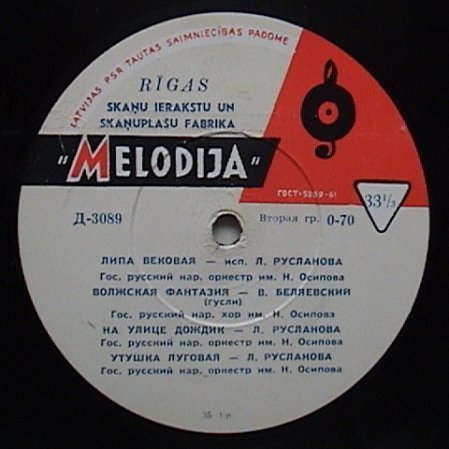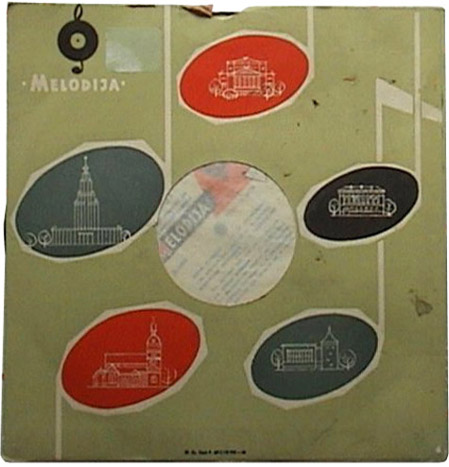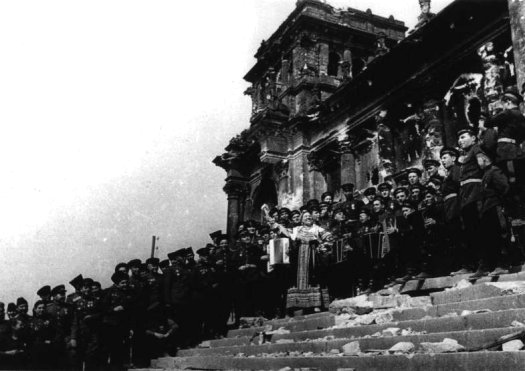2003 SEPTEMBER 16 #259
Lidija Ruslanova - Utushka Lugovaja (Meadow Duckling)
Like most of the fans of obscure recordings who contribute to this site, I scour the record racks of thrift stores, second-hand shops and yard sales to find new audio oddities. Just north of downtown Los Angeles is the St. Vincent de Paul Society's main outlet thrift store, a cavernous emporium filled with clothing, furniture, appliances, bric-a-brac and, of course, records. One day, on one of my frequent visits, I came across a 7-inch 33 1/3 rpm record stuffed in amongst the LPs. I was intrigued by the spiffy mid-century Russian graphics on the sleeve and decided to lay out the 25 cents required to discover what was on the record itself.
The record contains eight tracks, four of which (including today's selection) feature vocals by a woman who can best be described as a Russian Edith Piaf. Mostly (like Piaf's work) they are mournful and melodramatic numbers, but this one is different; a rousing Russian party tune, if you will. Aside from that, I can't tell you anything. Who is she? I haven't a clue. What is she singing about? It's anyone's guess. Is she relating a famous Russian folk tale? Exhorting peasants to shake their collective booties? Railing against capitalist pigs getting fat on the blood of the workers? Your guess is as good as mine. All I know is that it has a good beat and you can dance to it. So pour a tumbler of your favorite vodka or cough syrup and enjoy!
- Andre Dupuy, callingandre@hotmail.com
TT-1:38 / 1.5MB / 128kbps 44.1khz


(Images courtesy of Andre Dupuy)
Frank in Cologne, Germany writes:
Here is some information about your Russian record. The
correct entry for the chosen track is Lidija Ruslanova
- Utushka Lugovaja ("Meadow Duckling"). Russian
folk song, accompanied by The Ossipov Russian Folk State
Orchestra. What you mistook for the interpret is just
a Lettish production note by the record manufacturer -
obviously a Latvian pressing branch of the Soviet State
label "Melodiya", situated in Riga. (By the
way, they only had that ONE label in former Soviet Union.)
Misspelling the song title is pretty easy, as quite a
few of the Cyrillic characters look similiar to the Latin
alphabet but have a different meaning.

Lidija Andrejevna Ruslanova (1900-1973)
PRIMA DONNA OF RUSSIAN FOLK SONG
October 27th [2000] marked the birth centennial of
a prima donna of the Russian folk song Lidia Ruslanova.
True art outlives its performers. Ruslanova's songs
live on in tape recordings and can often be heard in
the performance of modern folk singers. Admired and
adored by everyone, Ruslanova enjoyed tremendous popularity.
Once when she was on concert tour in the Far East, a
crowd of devotees held up the train she was traveling
in. Though not a beauty, she was awfully expressive
in a peculiar way. Some well-known Soviet film-maker
remarked about Ruslanova that had she been an actress,
she would have been doomed to play stepmothers and witches.
Straightforward and outspoken, uncompromising and proud
of herself, she wasn't easy to deal with. But when she
sang... oh, that was real marvelous! Ruslanova was born
into a poor peasant family in a small village not far
from Saratov on the river Volga. She grew up in an orphanage
where she had been put after both of her parents died.
"Songs were my nannies. They thought me everything
a person can be taught. They brought me up, educated
me, helped me to better understand the world",
recalled the singer. "What would I be without songs?
When, a poor orphan, I earned my first bread by singing,
my grandmother scolded me. "God Almighty, what
a shame to sing and dance for bread!", she said.
But I wasn't ashamed ..." The choir of the orphanage
where Ruslanova lived sang in a church. She performed
the solo part. To hear a little girl with an incredible
voice people sailed up down the Volga from Saratov and
other neighborhoods. When she grew up, Ruslanova took
a job at a furniture factory. The smell of paint and
varnish irritated her throat, but she sang all her way
through. At 16 she was invited to sing at a concert
at the Saratov Opera Theatre. Her independent career
started in Rostov-on-the-Don in 1923 and there, in Rostov,
she gave her last concert 50 years later. As usual,
there was no fixed program. Ruslanova would sing a couple
of songs of her own choice and ... During World War
II she performed for troops at the frontline. To them
she was a symbol of the Motherland, a symbol of home
and hope. At one of such concerts she met her love.
Her husband - commander of a cavalry corps General Vladimir
Kruchkov - was awarded the Golden Star of The Hero Of
The Soviet Union for his combat exploits. When the war
was over, there was a huge concert near Reichstag to
mark Nazi Germany's surrender. One of its participants
Yuri Yaroslavtsev recalled later: "As we were driven
across the city, we could smell pungent smoke coming
from the ruins. Soldiers crowded around Reichstag, eager
to inscribe their names on its walls... Each of us felt
the significance of the moment. We sang about things
that are dear to every soldier, the things that remind
them of their Motherland and of their loved ones. When
Ruslanova belted out the Russian folk song "Valenki"
(felt boots) in her inimitable style - that was an unforgettable
sight". 1948 brought about a new wave of Stalinist
reprisals. Ruslanova's husband and then she herself
were arrested. She was pressed to sign a forged accusation
of treason against her husband, but refused and spent
five years in prison on the allegations of anti-Soviet
talk and anecdotes. In 1953 after the death of Joseph
Stalin she was released. October saw a string of concerts
in various Russian cities to mark Ruslanova's centenary.
Says a folk song performer Lyudmila Ryumina: "To
me she will always be the highest standard. Russian
folk songs performed on stage must be colorful, spicy,
interesting. In my opinion, Ruslanova is an exemplary
folk singer" . Taken from:
http://www.vor.ru/culture/cultarch140_eng.html#2
(You also can find another picture of her there.)
Another source claimed that Ruslanova was also put into a Siberian 'gulag' around 1937/38.